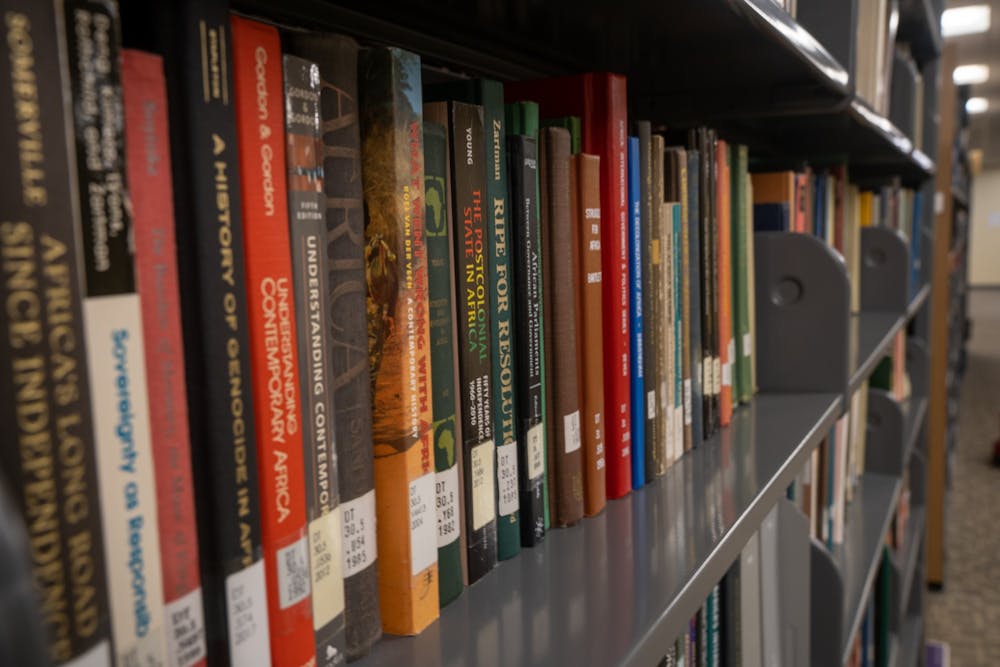Editor's note: A previous version of this article incorrectly stated that the Africana Studies Advisory Board had pushed for a concentration or minor of Africana Studies.
The Africana studies program will offer two courses for the fall semester: Introduction to Africana Studies and The Rumors of War. Both classes are part of a new major and minor program after students and faculty fought to implement Africana studies as a distinct curriculum at the University of Richmond.
“There was something missing from our education,” junior Shira Greer said, recalling her and four other students’ motivation behind the original proposal for introducing the Africana studies program.
Greer, along with alumna Kayla Corbin, ‘21, and senior Quell Shaw, took the Black Radical Tradition course of the Political Science Department in the fall of 2019, and it sparked a conversation about course offerings that focused distinctly on Black academic thought, theory and intellectualism, she said.
“We wanted something different, something distinct,” Greer said. “Though the goal was to implement an entire new department for Africana studies, a major and minor program is definitely a large step in the right direction.”
After the proposal – written by Greer, Corbin, Shaw, senior Akeya Fortson-Brown, and TJ Tann, ‘21 – came out in February 2020, there was still a long road ahead for Greer and her peers. It took months of conversation and advocacy for the program with students, faculty and administrators, Greer said.
The Africana Studies Student Committee received initial pushback from then-Dean of the School of Arts and Sciences Patrice Rankine and Jeffrey Legro, executive vice president and provost, on the development of a whole department. However, having only a minor or concentration in Africana Studies would completely miss the point of having a dedicated place to study Black thought, Black theory and Black philosophy, Greer said.
Ernest McGowen, the program’s coordinator, and Manuella Meyer, associate dean of the School of Arts and Sciences, said the program would include widely recognized and award-winning faculty members from political science, history, art history, visual art and other departments. The program will work in conjunction with other departments, and classes from these departments will count as electives toward a major or minor in Africana studies, according to the course study outline.
While the program is housed in the School of Arts and Sciences, the Jepson School of Leadership will allow expanded course offerings focusing on race, colonialism and Black intellectualism, according to the outline.
One of the biggest draws of the program is how manageable the curriculum is, McGowen said. Because the minor is only five units, McGowen said he hopes students can easily balance an Africana studies minor with other departments such as journalism, sociology and even STEM. With the uptick of popularity in dual degrees and multiple minors, McGowen said he hoped that Africana studies would draw students who are interested in concentrating on communities of African descent and the African diaspora within other disciplines.
“The program is committed to expanding research paradigms that had traditionally placed the West at the center of knowledge production and cultural analysis,” Meyer wrote in an email to The Collegian.
Every program in the School of Arts and Sciences has a research method requirement, but the strategy for it under the Africana studies program will be especially important because of the role of race in everyday life, McGowen said.
Enjoy what you're reading?
Signup for our newsletter
Because race — the underlying theme of Africana studies — is already a part of everyday life, people think they understand the full scope of it, especially from the influence of different media outlets, McGowen said. That’s why Africana studies aims to teach students the full academic scope of race and identity and Black intellectual thought.
“Whenever someone walks in the door, they think they know race,” McGowen said.
With classes teaching students how to find academic sources, navigate them and then critiquing them will allow Africana studies students to possess the skills that come along with studying such an interdisciplinary, critical and relevant field, McGowen said.
Meyer wrote that she was especially excited to teach her course, Introduction to Africana Studies, next semester, as well as see the engagement and development of The Rumors of War, taught by Jillean McCommons, a new professor jointly hired by the history and Africana studies department. McCommons’ scholarly work focuses on Black Appalachia and the study of land, identity and place within this discipline, Meyer wrote.
McGowen has watched a stretch of racist events leading up to the Protect Our Web movement that officially began in 2019, he said. The Black Student Coalition only shed light on what had been occurring for years, and called for action to improve campus culture, McGowen said.
“I think [the implementation of the program] is a signal of what the university cares about,” McGowen said. McGowen sees the program not only as a place for interested students to develop critical skills and engage in Black theory and intellectualism but as a step in the right direction for a more inclusive campus.
Despite the advancements in the creation of the program, students are frustrated by the lack of an endowed chair and a full Africana Studies Department that was originally proposed, Greer said. She is content with the implementation of the program, but there are many steps the administration still needs to take, she said.
Greer said she hopes that with the continual growth of Africana studies, people at UR will see the positive impact and importance it has for the students and UR culture.
Contact news writer Zoe Beede at zoe.beede@richmond.edu.
Support independent student media
You can make a tax-deductible donation by clicking the button below, which takes you to our secure PayPal account. The page is set up to receive contributions in whatever amount you designate. We look forward to using the money we raise to further our mission of providing honest and accurate information to students, faculty, staff, alumni and others in the general public.
Donate Now



